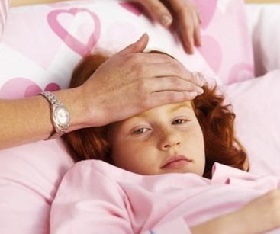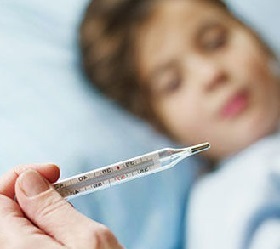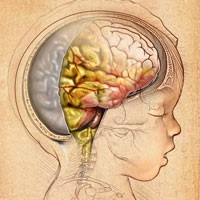 Serous meningitis is a very dangerous and serious disease, equally for children and adults. When this disease occurs, inflammation occurs in the membranes of the brain.
Serous meningitis is a very dangerous and serious disease, equally for children and adults. When this disease occurs, inflammation occurs in the membranes of the brain.
The following varieties of serous meningitis are distinguished by etiology: fungal, viral and bacterial (syphilitic, tuberculosis, etc.) meningitis. In addition, the primary and secondary forms are distinguished.
Primary meningitis occurs due to primary damage to the meninges, which are not preceded by any infectious agents. Secondary damage to the meninges occurs after the infection, as a complication.
The most sparing form of meningitis is the one that was caused by viral infections. The disease proceeds without serious complications, and with timely treatment of highly qualified specialists, passes without a trace. If the treatment is too late, or it was not quite adequate, then in the case of viral meningitis, the consequences for the adult or the child can be very sad.
How is serous meningitis transmitted and what is it?
What it is? Serous meningitis is a rapid defeat of the brain envelopes, which is characterized by a serous inflammatory process, the causative agent of which may be viruses, bacteria or fungi.
Inflammation of the meninges develops rapidly. The main reason is representatives of the enterovirus group. It is easy to get infected or become a carrier of the virus in the following situations:
- Contact infection. Bacteria and microorganisms enter the body with dirty food - fruits and vegetables with particles dirt, with the use of unsuitable water, while neglecting the rules of personal hygiene.
- By airborne droplets, serous meningitis is transmitted when the pathogen is localized in the mucosa of the respiratory tract. When coughing, sneezing, infectious agents, being in the air in the form of an aerosol, get into the body of a healthy person with contaminated air.
- This virus is most likely to pick up when swimming - in water bodies, in the pool, and the greatest chance of getting infected in people with weak immunity.
Especially dangerous is the serous inflammation of the brain envelope for children of the first year of life - during this period, the effect of infectious agents is so detrimental affects the children's brain and nervous system, which can cause a delay in mental development, a partial violation of visual and auditory functions.
Specific symptoms
When examining a person with serous meningitis, the symptoms are expressed in the excess tension of a group of neck muscles, their rigidity, that is, not the ability to bring the chin to the chest.
There are also severalmeningeal symptoms, such as:
- Kernig Symptom- the impossibility of unbending the leg bent at right angles.
- Symptom of Brudzinsky: the bottom - if you unbend one bent leg, this leads to a reflex bending of the second leg, the upper one - if the head is bent, the legs are involuntarily bent.
All these symptoms of serous meningitis can be expressed in varying degrees, in less or more, in very rare cases, these signs can be combined with generalized damage of other organs.
Symptoms
In the prodromal, or intermediate stage between the incubation period and the disease itself, there is a slight increase in temperature, weakness, loss of appetite.
On average, the period lasts up to 3 weeks, and then there are directly signs of serous meningitis:
- the temperature rises to 38 degrees and even higher;
- sharp headache in the forehead and temples;
- stitching in the eyes, pain when looking from one subject to another;
- nausea, vomiting;
- photophobia;
- dizziness.
In children, in addition to the described symptoms, there are:
- hallucinations;
- rave;
- swelling of the fontanel in young children;
- convulsions.
In some cases, there is only a slight malaise, which is often attributed to overwork. That's why if you suspect serous meningitis, you need to make a diagnosis.
Symptoms of serous meningitis in children
 Serous meningitis adults are ill very rarely, since their immunity is already "familiar" with a variety of different infections. But the children's body is just beginning to "master" the world, including learning new viruses. Therefore, their body reacts to the infection roughly. Serous meningitis in children is quickly diagnosed and easily treatable.
Serous meningitis adults are ill very rarely, since their immunity is already "familiar" with a variety of different infections. But the children's body is just beginning to "master" the world, including learning new viruses. Therefore, their body reacts to the infection roughly. Serous meningitis in children is quickly diagnosed and easily treatable.
At the very beginning, this disease in children is very acute, and its symptoms are pronounced, that is, the child is getting better temperature, which sometimes reaches 40 degrees, the child feels pain in the muscles and there is a constant headache. In addition, if the disease is diarrhea and vomiting, the child becomes restless, his stomach may ache or cramps appear, in a dream the patient may be delirious.
Very often, against the background of the main symptoms, serous meningitis in children is also manifested by signs of acute respiratory infections - sore throat, cough, runny nose, eye sensitivity. The child becomes easier in a darkened room in a pose on his side with his head thrown back.
Serous meningitis in adults: symptoms
In the case of this type of meningitis, the first symptoms in adults are insignificant. It can be: general weakness, weakness, weak headache, perspiration and sore throat, cough, runny nose.
Such symptoms are typical for various acute respiratory viral infections that are easily treatable, so most patients do not pay attention to them special attention, as a last resort - start to accept various preparations directed on improvement of state of health.
The obvious symptoms of serous meningitis in adults are:
- high body temperature;
- a migraine headache that does not stop even after taking an anesthetic;
- vomiting without nausea, regardless of eating;
- chills, fever, blurred vision;
- a state of delusions, hallucinations;
- abdominal pain, indigestion, diarrhea;
- irritability;
- lack of appetite;
- convulsions, loss of consciousness (in severe cases).
In the cerebrospinal fluid of the patient there is an increased level of lymphocytes. Diagnosis is based on lumbar puncture data, laboratory diagnosis of blood and urine.
Treatment
 With any suspicion of meningitis, immediately call an ambulance and hospitalize the child or adult in the hospital.
With any suspicion of meningitis, immediately call an ambulance and hospitalize the child or adult in the hospital.
In view of the viral etiology of the disease, the use of antibiotics is impractical. An important role in the treatment of serous meningitis in children and adults can play antiviral drugs - arpetol, interferon, acyclovir.
With immunodeficiency, the patient is prescribed a course of normal human immunoglobulin, donor and placental gamma globulin. If serous meningitis is provoked by measles, then anticonvulsant immunoglobulin is used, influenza is influenza.
Dehydration is essential for reducing intracranial pressure, so diuretics are prescribed - Lasix, Furosemide. At a temperature of more than 38C, antipyretic agents are used - paracetamol, ibuprofen. Also, each patient is prescribed antihistamines, which relieve fever and the main signs of a meningic syndrome. Such drugs include suprastin, tavegil and all known dimedrol.
With timely adequate treatment, serous meningitis in children, in contrast to purulent, are benign, not long in duration and rarely cause complications.
Consequences of serous meningitis
According to the doctors, half of the patients cured of meningitis still have health problems for many years. After meningitis, patients complain about difficulties with remembering information, spontaneous muscle contractions, not strong migraine-like pains.
But these complications are characteristic of mild forms of the disease. If the disease was difficult, the person may even lose hearing or sight. In addition, some forms of this disease can provoke a disruption in the brain and the complexity of mental activity.
For the sake of justice it is necessary to say that fortunately such consequences of the disease happen only in one and a half percent of all those who have suffered this disease. But in very rare and complex cases this disease can even lead to death.

How to choose probiotics for the intestine: a list of drugs.

Effective and inexpensive cough syrups for children and adults.

Modern non-steroidal anti-inflammatory drugs.

Review of tablets from the increased pressure of the new generation.
 Antiviral drugs are inexpensive and effective.
Antiviral drugs are inexpensive and effective.



